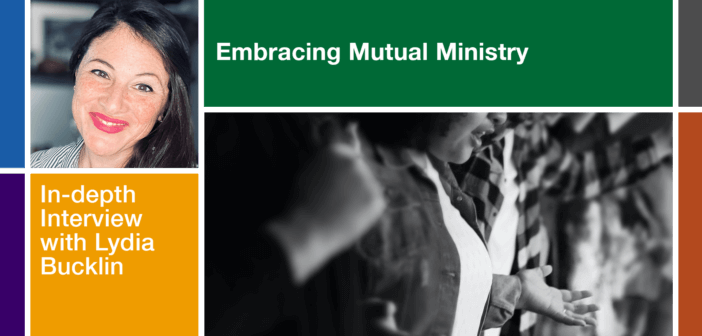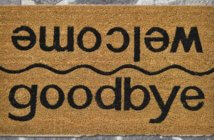How can your congregation function as a community of ministers rather than a community gathered around a single minister? Lydia Bucklin of the Episcopal Diocese of Northern Michigan explains the Mutual Ministry Initiative and how this approach to shared ministry is flourishing among smaller churches in the Upper Pennisula of Michigan.
Listen to this interview, watch the interview video on YouTube, or continue reading.
Ann Michel: You serve in the Upper Peninsula of Michigan. Could you describe the overall context and the typical profile of the churches you work with there.
Lydia Bucklin: The Upper Peninsula is pretty remote. We are three percent of the population of Michigan, but we’re 30 percent of the landmass. There’s a lot of forest. We’re surrounded by water. Our winter starts in October and ends in May. So, it’s a rugged place. Our folks are hardy and scrappy and resilient. And our churches are small but faithful. The diocese has about 24 congregations. Some are about a dozen people. Some have 50 or 60. Some are a bit larger. And we rely on the faith that God has provided us everything we need for ministry because, if we didn’t, we probably wouldn’t keep going. We really utilize the gifts of everyone, and we are very connected in our local communities.
Ann Michel: Because these are mostly small communities, you’re relying on a program called the Mutual Ministry Initiative to help them organize themselves for ministry. Could you describe that initiative?
Lydia Bucklin: Mutual Ministry is an ecclesiology. It’s a way of being and understanding church. In the past, it’s been called total ministry, baptismal ministry, ministry development, or shared ministry. It really took hold in the 1980s and 1990s in some of the smaller dioceses of the Episcopal Church, places like Nevada, Wyoming, and Alaska.
These remote places were kind of the canaries in the coal mine in saying the idea of one clergy person per congregation who is paid through just one congregation isn’t sustainable anymore.
In our context, we form ministry teams in local congregations who have the support of a seminary-trained, paid ministry professional called a missioner. A missioner doesn’t have to be ordained, although typically they are. They accompany and walk alongside the local ministry teams, generally working with a few different congregations.
The Mutual Ministry Initiative is a more recent program funded by Lilly Endowment Inc. through Virginia Theological Seminary to give more infrastructure to this movement by helping to train and form leaders in this model of ministry. It’s very different than seminary training where someone comes out being “the expert in the room” or “father or mother knows best.” Instead, it facilitates learning and shared ministry, and helps people discern their gifts and some skills that we didn’t necessarily focus on with clergy in the past.
Ann Michel: On the ground in a local congregation, what does this Mutual Ministry team look like?
Lydia Bucklin: It looks different in different places. We start with what’s called a discovery process, similar to a discernment process, with folks in the congregation who believe they have gifts and are ready to use those gifts in a more formal, liturgical way. Through the discovery process, people name the gifts they see in each other and have an opportunity to affirm their own gifts. It’s a process that goes a bit further than Sunday school or adult formation. They spend about three years in community together, studying, learning, and praying, working with a missioner like me who serves as a coach and a guide. After three years, a really solid team develops — a group that covenants with each other, with the rest of the congregation, and with God.
People often ask, “How do you get people to even agree to this. It sounds like a big commitment. Everyone’s so busy these days.” But once people become part of this group, it’s so life giving and enriching that they don’t want to miss it. They get excited. They bring food to share. They offer prayers for each other. They share more deeply and more vulnerability than they would just on Sunday morning.
Ann Michel: As this team evolves and matures together, do they take on specific roles?
Lydia Bucklin: Yes. For instance, one of the small communities I serve has two people who were ordained as presbyters (priests) in the church and others who were commissioned as preachers. Someone else was commissioned as a deacon. And when we get together quarterly or seasonally to do the scheduling, we divvy up the roles. Because you have lots of people using their gifts at different points, no one person is overburdened with having to write the sermon every single week. We find when we share the responsibilities it feels more doable. And more people know what’s going on. Everyone in the community is able to set the table for the Eucharist and knows what liturgical season it is. It’s just a higher sense of engagement with the worship service in general and a very hands-on way of being.
Ann Michel: I often find that people who are not clergy are very reluctant to provide spiritual leadership because they’re taught to think that spiritual authority resides exclusively in the clergy. How do you encourage people to embrace a more robust sense of how God is calling and gifting them for ministry?
Lydia Bucklin: I think every part of the institutional church sets us up to abdicate our own sense of our gifts and our spirituality. Meanwhile, we have all these brilliant people in our midst who in their daily life are totally doing ministry. But they would never call it ministry because “that ordained person” who has the credentials and has gone to seminary is the expert. I think part of this is how we talk about theology, how we relate our faith stories to everyday life to help people make those connections by sitting and sharing stories and realizing the ways they are called. They’re already doing diaconal things. They’re already doing the priestly acts of reconciliation, the pastoral care for their neighbors or for their children. It’s not having to learn one more thing, but it’s fully integrating ourselves into our faith and into our lives as followers of Jesus so that we have the language. And it feels more seamless when church isn’t just something that happens on Sunday morning; it’s that the people we are caring for and who are caring for us can feel Jesus and we see Jesus in them. The more we live that way and model that, the more I think people come to church willing to share those experiences, to be nourished, and to go back out and do ministry.
Ann Michel: I think there’s a tendency in small churches that can’t afford a full-time, seminary-educated clergyperson to see this approach to ministry as “less than.” How do you push back against that idea?
Lydia Bucklin: I recently was in the Diocese of North Dakota where they are looking at more collaborative ways of being. And one person said, “There’s a worry that we are going to have to be like Northern Michigan.” And I thought, “Oh, that makes me sad. I love being part of Northern Michigan.” There is this sense of deficiency because we have been so obsessed with numbers — with budgets, with the number of people in the pews, with being able to afford our buildings. The whole business of being church has been so wrapped up in this Western, capitalist, consumerist, transactional, institutional sense of church. Instead of thinking that small is meager and puny, we say, “We’re small and mighty. We’re small and we have such a big impact.”
This way of being is so liberating and freeing for clergy in particular, in terms of their wellness. To have a team of folks who know their gifts and take responsibility for their ministry allows the clergyperson to know and use their gifts without having to over-function. There are things I’m not great at that someone else is gifted for. And when we really believe that and step into those gifts, we are able to retain and care for our clergy much more.
Ann Michel: I understand this ministry model is also used in congregations that do have one or more resident clergy persons. How does it work in that situation?
Lydia Bucklin: The Episcopal Cathedral in Minneapolis uses this model. They have a dean and some other paid clergy and a big staff. They also have a ministry team who has been trained, informed, and serves alongside. In a larger system, when you have multiple services and many different ministries going on, it’s wonderful to have a team that’s been commissioned to really own their ministry. You know this group of people will show up. They’re going to be there. I think it takes a village to care for all of us, not just children.
I think the exciting thing about mutual ministry is that there still is a place for paid professional seminary-trained folks. It’s just a different type of role. We have lots of positions in our small diocese. To fund them, our local communities all contribute 40 percent of their net operating income into one pool. It’s an early church model where we put our resources into one bucket, and then everybody gets the same care. We have churches that have big endowments from the iron ore days when their towns were booming. They are now very small, but they have millions of dollars in their endowments. Their 40 percent is going to be higher than a small town that doesn’t have those resources. But they all receive the same care. That was a big shift. Just because one community has more money, they don’t necessarily deserve a better pastoral presence or more pastoral presence. If we truly are the body of Christ, then when we put in together, when we all share, everyone can be cared for. This also means that our paid clergy are all paid the same amount, so there isn’t a competitive mindset or a hierarchy where a position at one particular church is seen as worth more because the pay is higher.
Ann Michel: My ears are very attuned to how the language of ministry reinforces clericalism. “Laity” means “people of God.” But in common usage lay means amateur, inexpert, common, or secular as opposed to spiritual. The language of pastoral identity is built around the metaphor of shepherding and sheep, which I find disempowering. How do we learn to talk about ministry in ways that promote a more inclusive practice of ministry?
Lydia Bucklin: You know, even the word “rector” means “ruler” in Latin. And possessive pronouns, like “my” church or “my” congregation. In the Episcopal Church, if a priest moves on, we might say, “There’s a vacancy in the church.” Well, the church isn’t vacant. It’s still filled with people who are engaged in ministry. Vacant because of that one person! That’s silly and that’s just not true.
We need to be intentional about how we use our language because it makes a difference. We don’t use “The L Word” very much. Folks are ordained or not ordained. We just gathered for our diocesan convention, and you really wouldn’t know who is or isn’t ordained. You don’t receive different folders. We don’t even vote by orders. We changed our rules. If we really take the priesthood of all believers seriously, if we really take the ministry of all the baptized seriously, then does it make a difference?
If you look at the back of a service bulletin, who gets a title? It would probably be the Reverend Canon Lydia Kelsey Bucklin. I have friends, especially women of color, who have said, “I’ve worked very hard for this title. I need the respect of this title.” I get that. I’m not saying get rid of all the titles. But if we’re going to use titles for some of us, let’s use titles for all of us.
Ann Michel: How do you see mutual ministry unfolding as the Church moves forward in this liminal time when so many of our inherited paradigms of ministry are proving inadequate or unsustainable?
Lydia Bucklin: I sure hope it’s embraced, and not because it’s seen as the only option, but because it’s truly where the Spirit is leading us. We have sustained this model for 30 years, even through the pandemic. Yet there are still people in the wider Church who say, “Oh, that diocese in Northern Michigan should just merge with another diocese, because they’re just too small to be viable.” I can tell you, for folks who live here and are part of the life and ministry, we are viable. We are vital. Their ministry is making a difference in countless ways. And we aren’t a burden to anyone else. A lot of my job is to champion what the people are doing. “You’ve got this. You don’t need me to empower you. The Spirit has given you what you need, and you should be proud of what you’re doing.”
I want to support the communities that think “Oh, we’re down to only 15 people. I guess we’re over.” But that also means making a shift. We always say God gives us everything we need to do exactly what God’s calling us to do. But that involves listening to what God is calling us to do. And it’s not what we used to do. Some will say, “We used to have a choir.” “What about the Sunday school?” Well, maybe they can’t do those things. But what are the gifts? What are the needs of the community? How do we match those up? And how do we make an impact with what we’ve been given to do? And then, you see new life start to emerge. Sometimes it means sharing our building and taking on some entrepreneurial opportunities. But I think there is a lot we can be doing when we believe in ourselves in this time of rediscovery. To me, it’s an exciting time.
Related Resources
- Synergy: A Leadership Guide for Church Staff and Volunteers by Ann A. Michel
- More Church Leaders|Stronger Church Leaders, a Lewis Center video tool kit resource
- Toward a Compelling Theology of Lay Ministry by Ann A. Michel
- Bivocational By Choice featuring Ben Connelly — Leading Ideas Talks podcast episode | Podcast video | In-depth interview
- Expanding the Ministry of Laity in Worship by Andy Lunt and Ted Brown




